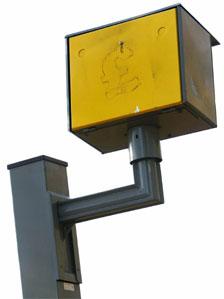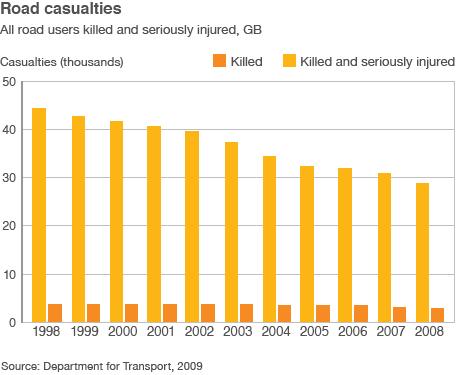Do speed cameras really cut accidents?
- Published
Motorists in Oxfordshire might feel a little more free with the accelerator from Tuesday as the council was due to switch off its fixed speed cameras. The move is angering some safety campaigners, but others say it will have little impact on accident figures.

For many motorists there are few things that get their annoyance levels revving more than the dreaded speed camera.
Ever since the devices started to sprout beside Britain's roads in 1992, they have been public enemy number one for numerous drivers.
It's hard to exaggerate how divisive these jutting luminous boxes have become. Safety campaigners argue passionately that they are life-savers, forcing drivers to keep within prescribed speed limits. Yet many motorists believe they are more about raising money for government - which gets all the fines they raise - than reducing risk.
Now, 18 years, 6,000 cameras, and an estimated £100m in fines later, speed cameras could be nearing the end of the road - at least in England and Wales.
The ultimatum comes after Downing Street announced it would be cutting the road safety budgets it gives to English and Welsh local authorities by 40%, as part of its wider efforts to reduce public spending.
Road Safety Minister Mike Penning said at the weekend that this cut - which specifically ends central funding for fixed speed cameras - was "another example of this government delivering on its pledge to end the war on the motorist".
As a result of the reduced funding, Oxfordshire County Council is expected to confirm on Tuesday that it will end its spending on all its speed cameras, resulting in the 72 fixed and 89 mobile speed camera vans it funds across the county being withdrawn.
With a number of other local authorities saying they are likely to follow suit, the key questions are whether speed cameras have been successful in reducing road traffic accidents, and if we may now see a rise in such incidents.
'Serious danger'
Thames Valley Safer Roads Partnership, the organisation that operates the speed cameras in Oxfordshire on behalf of the council, has already said it fears a big increase in accidents.
"There's a serious danger we will see an increase in casualties," says its communication manager Dan Campsall. "We may be counting the cost of this in terms of bodies."
Figures from the partnership appear to back up this claim.
They show that at the 212 fixed camera sites across the wider Thames Valley region - which also includes Buckinghamshire and Berkshire - there was a 38% drop in vehicle collisions.
This is when you compare the three years before each camera was put in place with the most recent three years.
The chart below shows that in the 11 years between 1998 and 2008, a time during which speed cameras proliferated, the number of road deaths remained fairly constant. However, there was a cut in serious injuries - although opponents of speed cameras will say this is largely down to other factors, such as better safety standards in new cars.
Statistics from Swindon Borough Council also appear to contradict those from Thames Valley.
Swindon switched off all its fixed speed cameras a year ago, saying they weren't an effective tool in cutting road traffic accidents as only 6% were caused by people speeding, and that accident levels were actually rising across the borough.

The council said it would instead target its road safety funds at "accidents at junctions, at night, among younger drivers, and on rural roads".
A spokesman for Swindon council says that in the first six months after the cameras were switched off accident numbers across their sites "remained the same".
While he admits "this is too short a period to draw any meaningful conclusions", he adds:"However, warnings that accidents and casualties would immediately rocket after the cameras were switched off have so far been proved wrong".
'Wider problem'
The RAC Foundation motoring think tank says speed cameras should not be treated in isolation, and that "the broader problem is the slashing of the [entire] road safety budget".
Stephen Glaister, director of the RAC Foundation, adds: "The roads minister Mike Penning says he hopes councils will now focus on other ways of reducing road casualties, but how can they do anything if the cash to do it with is not available?"
"For example, if the government [still] believes speed limits are a good thing then who is going to enforce them? Certainly not the police who also face a large reduction in resources and manpower."
However, if Oxfordshire does go ahead and end funding for all its fixed and mobile speed cameras, it will be the police that has to fill the gap with mobile hand-held speed detectors, as these are both operated and funded directly by police forces.
Turning his attention to alternatives to speed cameras, Mr Glaister is cautious about the long-term effectiveness of electronic signs that flash up how fast people are driving - so-called speed indicator devices.
"The experience in London is that they do slow traffic to start with, but as motorists become more used to them then speeds increase again," he says.
'Appalled'
For Julie Townsend, deputy chief executive of road safety charity Brake, getting rid of speed cameras is "madness".
"I am appalled that Oxfordshire is threatening to do this," she says. "Speed cameras are a proven and cost-effective way of reducing deaths and injuries on the roads by controlling speed.
"Any reduction in the number of cameras is a real backward step in road safety terms."
Ms Townsend points to a 2004 report by University College of London which, studying 4,000 speed cameras over a three-year period, found a 42% reduction in deaths and serious injuries at their locations.
"Aside from the safety question, removing speed cameras also doesn't make any economic sense," she says.
"Not only do road deaths and injuries cause untold trauma to victims and their relatives, the cost is enormous for the emergency services and the NHS."
- Published25 July 2010
- Published22 July 2010